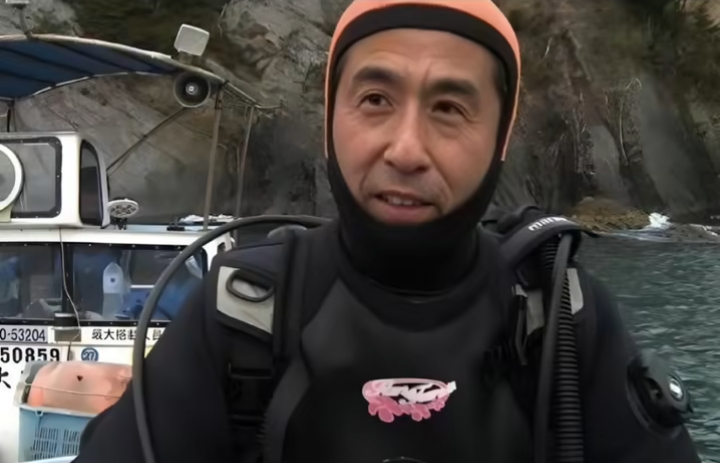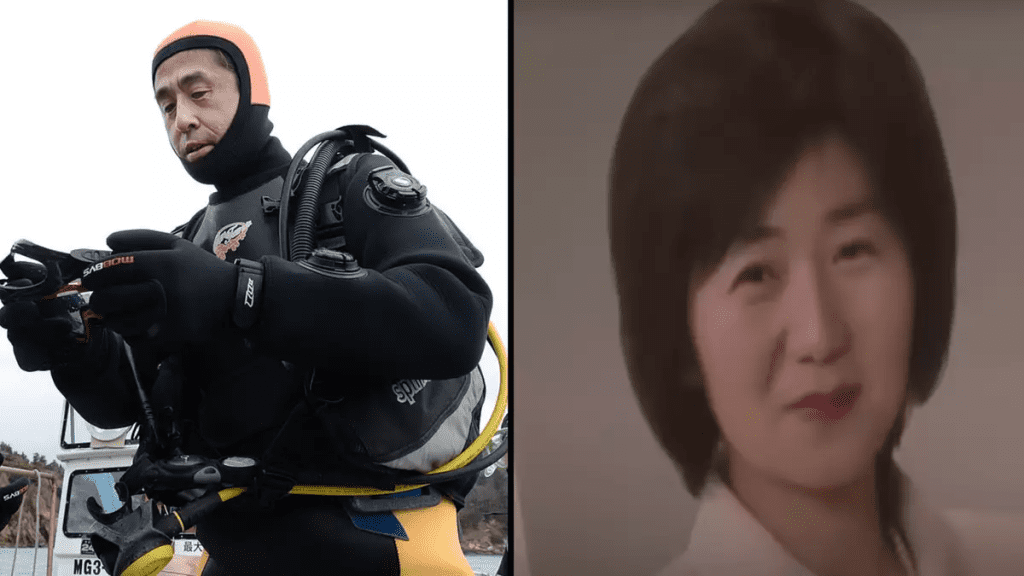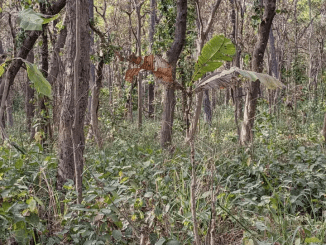In the wake of one of the most catastrophic natural disasters in history, the 2011 Tōhoku earthquake and tsunami, many stories of heartbreak and resilience have emerged. Among them is the extraordinary tale of Yasuo Takamatsu, a man who has spent over a decade diving every week, driven by an unwavering hope of finding his beloved wife, Yuko, who was lost in the disaster.

The 2011 tsunami was a tragedy that left scars on Japan and its people that may never fully heal. With over 15,500 lives lost, 450,000 people displaced, and entire communities obliterated, the scale of devastation was beyond comprehension. Among the countless lives disrupted, Yasuo and Yuko Takamatsu’s story stands as a poignant reminder of the enduring power of love in the face of unimaginable loss.
Yuko Takamatsu was working at a bank on that fateful day. As the tsunami approached, she sent her husband an email that would be her last words: “Are you OK? I want to go home.” These simple, heartbreaking words encapsulate the suddenness and terror of that day. Yasuo, who was in a a different town at the time, could do nothing but helplessly witness the destruction from afar. By the time he could return, Yuko was gone.
For two and a half years, Yasuo scoured the land, hoping against hope to find any trace of his wife. The discovery of her cell phone, found in a random parking lot, offered a fleeting glimmer of hope. Yet, the message she attempted to send, “The tsunami is disastrous,” remained undelivered, a haunting reminder of her final moments.
In September 2013, after exhausting every possibility on land, Yasuo turned his attention to the sea. He began taking diving lessons, determined to continue his search where the ocean had swallowed his beloved. Every week, without fail, Yasuo plunges into the depths, his heart heavy with longing but buoyed by an unyielding resolve.
A Japanese man named Yasuo Takamatsu lost his wife in the 2011 earthquake and has not stopped looking for her body for more than 10 years.
— Fascinating (@fasc1nate) August 22, 2024
He has dived more than 800 times into the ocean in an attempt to retrieve her. pic.twitter.com/Qiwt5SMns5
The sea is vast, mysterious, and often unforgiving. Yasuo understands the enormity of his task. “I do want to find her,” he admits, “but I also feel that she may never be discovered as the ocean is way too vast – but I have to keep looking.” His words, tinged with both hope and resignation, reflect the inner conflict of a man who refuses to give up but is acutely aware of the odds against him.
Yasuo is not alone in his quest. He is joined by Masayoshi Takahashi, a diving instructor who leads volunteer dives to help others searching for their missing loved ones. Together, they dive into the unknown, guided by hope, love, and a shared commitment to those they have lost. This small community of divers is bound by their grief, yet their collective efforts represent a powerful statement of human resilience and solidarity.

Ofunato city was devastated by the earthquake and tsunami that hit northeastern Japan on March 11, 2011. Credit: Satoshi Takahashi/LightRocket/Getty
Hope is a powerful motivator, and in Yasuo’s case, it is the force that drives him to continue his search, week after week, year after year. For many, the idea of diving into the vast ocean every week for over a decade might seem like an exercise in futility. But for Yasuo, it is a labor of love, a way to stay connected to Yuko and to keep her memory alive.
The psychological toll of such a relentless search cannot be underestimated. Every dive is a confrontation with the unknown, a journey into the depths of grief and loss. Yet, Yasuo’s determination is unwavering. He is driven by a need to find closure, to know what happened to his wife, even if the answer is one he fears.
Yasuo Takamatsu lost his wife in the 2011 tsunami. Her phone was found in a car park but searches overground came up with nothing. At 56, he got his scuba licence & spent twice a month in the years after diving twice a month to try and locate her.
— Garry McC (@TheGMcConnachie) August 22, 2024
I’ll be in the corner sobbing. pic.twitter.com/QHU4hU1dfG
Yasuo’s story is one of love and loss, of hope and despair, of resilience and resignation. It is a story that resonates with anyone who has ever lost someone dear. It is a reminder that love does not end with death, and that the bonds we share with those we love can endure even the most devastating of separations.
In Japanese culture, the ocean holds a deep significance. It is both a giver and taker of life, a source of sustenance and a force of nature that commands respect. Yasuo’s dives are not just a search for his wife, but a dialogue with the ocean, a plea for its mercy and understanding.
Yasuo’s decade-long search is a testament to the human spirit’s resilience. It is a legacy that will endure, not just in the annals of history, but in the hearts of those who hear his story. It is a reminder that even in the face of overwhelming odds, the human spirit can persevere.

The 2011 tsunami left an indelible mark on Japan, not just in terms of physical destruction, but in the collective psyche of the nation. The disaster forced a reevaluation of the relationship between humans and nature, and highlighted the need for preparedness and resilience in the face of such events.
Yasuo Takamatsu’s journey is one that may never find a conclusion. The ocean is vast, and the odds of finding his wife after so many years are slim. Yet, Yasuo’s story is not just about the search for a lost loved one; it is about the enduring power of love, the resilience of the human spirit, and the hope that keeps us moving forward, even in the face of insurmountable odds. We can only hope that one day, Yasuo will find the peace he so desperately seeks.


